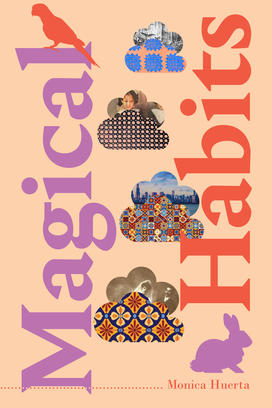Monica Huerta *06, Assistant Professor of English, Blends Family History with Speculative Magic
The book: Magical Habits (Duke University Press) draws upon Huerta’s experiences in her family’s Mexican restaurants and as a scholar of literature and culture to unravel the relationships between self, place, race, and storytelling. In a unique combination of narrative and criticism, she offers new perspectives on both our singular and collective histories. Magical Habits is also a mixture of mediums, blending personal essays and imagined life with photographs, restaurant menus, and other archival material as Huerta journeys through her family’s archives and excavates their past. Ultimately, Huerta shows us how to consider what it means to live with and peer beyond history — even as we are caught up in the middle of it.

Opening lines:
There were gifts. A platinum Cartier watch with gold rivets for my twelfth birthday. It sat for years in the medicine cabinet, beside the Visine and Midol. An antique ruby and diamond bracelet from Tiffany’s I wore twice, both times for him to see it. A gold teddy bear charm with tiny diamonds mounted on the bow around its collar. I liked how smooth, rounded gold tasted and felt on my tongue; I bit the bear until it had a dent in its back. A car at fifteen: a black Land Rover with cream leather seats. Four months later, I tore it through a wooden fence, and flipped into two backyards, narrowly missing a sunbathing mom lounging by her pool. My friend and I had to climb out through the passenger-side window, inhaling burned rubber, and mud, and grass, beyond our ability to tell them apart. A tie-dyed Beanie Baby bear, sent by FedEx from Guadalajara for my seventeenth birthday. A rose gold Cartier watch with pink diamonds around the face for my twenty-fifth birthday. Before I left New York the first time, someone I knew (he’d washed the dishes clean of his fingerprints and taken out the garbage) broke into my apartment and stole what hadn’t by then been destroyed, misplaced, or given away, even the fancy luggage I used to carry it all each time I moved.
The last one, for my thirtieth birthday, a brokerage account in my name that was “lost” during their divorce. The questions I had were about timing: Why now? Where has it been? Did you know to look for it, or did it find you? And did you try to cash it before sending me a printout of the balance? Somewhere in the shuffle of places and time, in the shifting ground of needs and desires, I gave up the need to know certain things certainly; there are entire lifetimes that could pass (that have passed) digging in—especially—the most stable ground. Even if some questions can acquire a faint smell and linger, can make quiet thick like soup, I accepted the brokerage account with a simple thank-you note. Better to pray for swift winds, and the wisdom to know the difference between which and which and for when.
He wore belts with large silver and gold buckles engraved with his name, a horse, or a horseshoe. Sometimes the figures were outlined with rhinestones. Parece un ranchero, my mother sometimes said in a way that let me know I never wanted to be that before I knew exactly what she meant, before I could place the word in a place, let alone a style, and definitely not in a story or in time, and before I knew that words can have a perspective and hold antagonism and ambition at the same time. After the Ultra SlimFast years, he wore belts with the designer etched and hidden into the backside of the leather. It was the desire to believe in an exclusively triumphant world, like a fairy tale where you end up sophisticated and just snap your fingers, click your heels, poof, zap, presto change-o, and abracadabra. At one point or another, you might learn what it means to have taste and that taste might be somehow important, and then later that the importance is only ever paid for with someone else’s blood. And here you are anyway, tangled in what’s earnest and tender about needing small comforts, loud coups.
It was his grumpiness that reminded her of “the one with Archie Bunker”—that’s what she called her favorite show, Where his wife is singing at the piano, she’d say, and with his pretty daughter. What does he call the son-in-law? ¡Ja ja ja! ¡Sí! Meathead. Cara de torta! Face of sandwich/hoagie, Sandwich/Hoagie-Face, is the right translation even though it’s not the correct one, Cabeza de carne, Carne cabeza. How much left over from not having the heart to tell her the difference, what horizons of parentage hold the possibility that it’s you who watches your parents either grow up or refuse to?
(Copyright Duke University Press, 2021.)
Reviews:
“Magical Habits is as much a treasure trove as it is a book—full of surprises, glittering insights, lyrical vignettes, personal archives, political history, family lore, and brilliant literary critique. The writing is exquisite, for the book is both polyphonic and constantly---effortlessly---changing tack. I would turn the page without any sense of where Monica Huerta might take me next, only knowing that I wanted to follow, that I did not want to come out from under this spell.” — Justin Torres, author of We the Animals
"Thoughtful, wry, and intimate, Magical Habits is a memoir that’s rich with questions about identity, heritage, authenticity, and the true American dream." — Meg Nola, Foreword Reviews












No responses yet